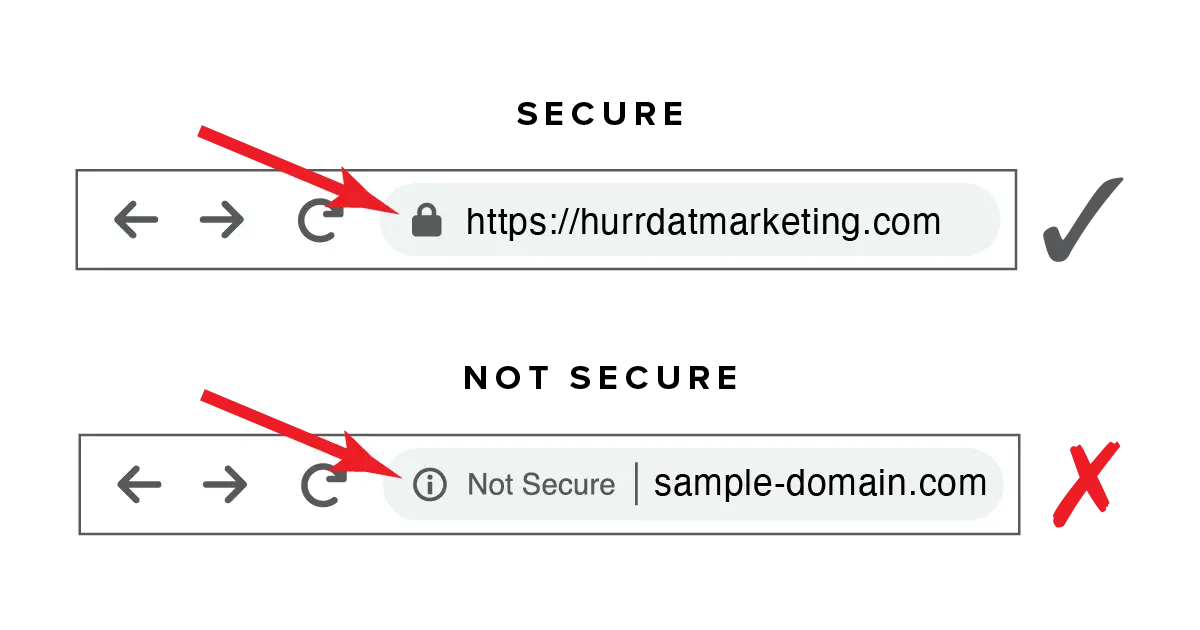SSL is essential to keeping your website visitors’ information secure and protected. Here’s everything you need to know about SSL certificates for websites and how they impact search rankings.

What Is SSL?
SSL, an abbreviation for Secure Sockets Layer, is a security protocol that encrypts communication between an internet user and a web server that was developed in the 1990s. SSL makes it more difficult for third parties or hackers to access transmitted information—like a customer’s IP address, location, credit card details, or other personal data. SSL certificates verify that your website follows the security protocol and expires after 13 months.
SSL vs. TLS vs. HTTPS
SSL, TLS, and HTTPS are all terms related to secure communication over the internet. However, they have different meanings and serve different purposes.
TLS, or Transport Layer Security, is the successor to SSL and the current standard since this protocol includes less security vulnerabilities than SSL. Unlike SSL, TLS can encrypt data transmitted to other types of applications beyond a web browser.
HTTPs stands for Hypertext Transfer Protocol Secure and uses TLS. It is the secure version of HTTP.
To know if a website has a TLS certificate, browsers display a padlock icon left of the website’s URL and preface URLs with “https://” instead of just “http://”.

Types of SSL Certificates
Secure Sockets Layer certificates provide varying levels of security at different price points. Some can also require more lengthy verification processes than others to issue. If you don’t have an SSL certificate or your current one is about to expire, there are four main SSL certificate options to choose from:
- Domain Validation Certificate (DV): Entry-level certificate that provides minimum level of security required for customer transactions and is best for informational sites, blogs, small e-commerce stores, and personal websites.
- Organization Validation Certificate (OV): Moderate-level certificate, providing middle-ground security often for business websites, e-commerce platforms, and educational institutions.
- Extended Validation Certificate (EV): Advanced-level certification to provide maximum authentication and data encryption for the highest level of trust and security, suitable for large e-commerce websites, online banking platforms, and government websites.
- Wildcard SSL Certificate: Secures a website’s primary domain, as well as its subdomains and can be issued at various validation levels—including DV, OV, and EV certificates.
| Price | Level of Security | Validation Requirements | Estimated Time | |
| Domain Validation (DV) | $ | Low | Email Address | <1 Day |
| Organization Validation (OV) | $$ | Medium | Business Registration
Physical Address Telephone Number |
1-3 Days |
| Extended Validation (EV) | $$$ | High | Legal Existence
Physical Presence Operational Legitimacy |
1-5 Days |
| Wildcard SSL | $-$$$ | Low-High | Varies | 1-5+ Days |
How Do I Find the SSL Information on a Website?
Whether you’re an online shopper or a business owner trying to confirm if a brand is legitimate and safe, follow one of these three steps to find SSL information on a website:
- Check the URL: The easiest way to check if a website is using SSL or TLS is to look at the URL in the address bar of your web browser. If the URL starts with “https://”, then the website is using SSL.
- Click the padlock icon: Most web browsers also have a padlock icon in the address bar that will give you more information about the website’s SSL certificate if clicked on, including the name of the website’s owner, the expiration data of the SSL certificate, the type of SSL certificate, the issuing certificate authority, and more.
- Use an SSL checker website, browser extension, or network inspection tool: There are many tools that will scan a website and tell you if it is using SSL and the certificate’s details. These tools can be more convenient and accurate than manually checking.
Does SSL Affect SEO?
Yes, SSL affects SEO indirectly. In 2014, Google announced that HTTPS was a ranking signal. Since then, Google has shifted to analyzing page experience health as a whole with its Core Web Vitals update. So, while HTTPS (or any security protocol) on its own doesn’t impact your SERP position, it does create a better user experience—with faster loading times, higher user trust, and likely lower bounce rates—which Google favors. And if you have two versions of your site—secure and unsecure—Google prefers to index the HTTPS version.
Do You Need an SSL Certificate?
Not all websites have SSL certificates, but if you collect any personal information from users—like login credentials, payment information, email addresses, or other sensitive data—your website needs a certificate. Though it costs money and requires periodic maintenance, this privacy feature can significantly help your brand’s trustworthiness. Here are other ways TLS certificates can benefit your website.
Increased Conversions
The visual cues provided by SSL, such as the padlock icon and HTTPS label in the address bar, signal to users that your website is taking steps to protect their information. When they see these signs, your audience feels more comfortable making a purchase or filling out fields with their personal details because they understand their sensitive data should be safe.
Improved Authority & Reputation
A website with HTTPS also indicates to users and search engines that the site is updated more frequently than an unsecure version would need to be. This leads people to believe that the content on your website is as accurate and up-to-date as possible, making them more likely to view your brand as a reputable source of information.
Reduced Bounce Rate
Google will automatically alert a user when it detects a site that may be unsafe to visit, throwing up a firewall that requires users to manually click through to the site. While this is not a redirect, it does increase the likelihood of higher bounce rates as users get spooked away.
Minimal Cost & Effort
A strong SEO strategy includes easy wins, and security protocol certificates are a relatively simple and cost-effective way to win over customers who care about privacy in their online transactions and communications. Plus, you only need to renew your SSL certificate on a yearly basis and spend about $60 per year on average for it.
How to Get an SSL Certificate for Your Website
Obtaining an SSL certificate involves several steps, which can vary depending on your hosting provider or the certificate authority you choose. Generally, here is the process for getting a TLS certificate for your website.
1. Find the Best SSL Certificate & Certificate Authority
Choose an SSL certificate that aligns with your website’s specific needs, the level of trust required, and your budget. Once you find a certification that’s right for you, you can purchase your certificate through trusted certificate authority (CA) companies like DigiCert, Comodo, or GlobalSign.
2. Generate & Submit a Certificate Signing Request
A certificate signing request (CSR) is a file that contains information about your website and your organization. You can generate a CSR using your web hosting control panel or a dedicated CSR generation tool. Once you’ve created your CSR, you’ll need to submit it to the CA that you purchased the certificate from. Then, they will typically ask you to provide additional information about your website, like your specific CNAME record, so that they can confirm you own the domain name that you’re requesting the certificate for.
3. Install & Configure Your SSL/TLS Certificate
After downloading your SSL file, adding it onto your website varies depending on your web hosting platform. Typically, here’s how to install an SSL certificate on your own, or some web hosting companies include free SSL installation such as Bluehost, Hostinger, and GoDaddy. Once that’s complete, be sure to set up 301 redirects from the HTTP version of your site to the new HTTPS version and then verify your SSL certification has been correctly implemented (by confirming the padlock icon appears in your URL).
4. Troubleshoot Potential SSL Issues
When installing an SSL certificate on your website, you may run into common SSL certificate errors that prevent the SSL from functioning correctly, such as:
- SSL certificate not found/not finished validating yet
- HTTPS redirect failure
- SSL certificate mismatch
- Mixed content errors
Even after installing the certificate on your website, you may see more issues come up, like an expired certificate error, so you’ll want to routinely monitor your website, stay up-to-date on cybersecurity best practices, and be proactive about the SSL certificate renewal process.
Want to improve your business website’s user experience? Hurrdat Marketing provides search engine optimization and web design services to get your website performing its best. Get started today!



